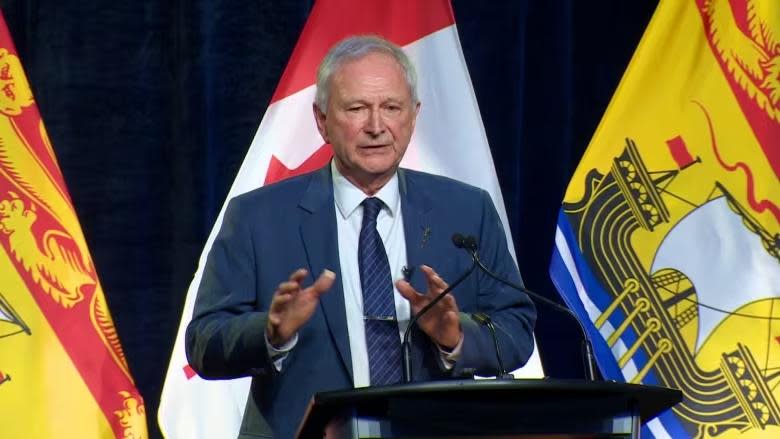Most people the New Brunswick government targeted to receive a new $300 workers’ benefit have not applied for the money, and $44 million the province set aside in last year’s budget to finance payments to the end of March went unclaimed, new figures show.
That will add $44 million to last year’s budget surplus, an issue New Brunswick Opposition Leader Susan Holt says the province needs to address quickly.
“The point was to help people who are struggling with the cost of living,” said Holt
“I definitely don’t think we should use this to inflate the surplus.”
The workers’ benefit was announced by Premier Blaine Higgs in a speech in Fredericton on Jan. 25.
He said it would help “low-income working families” with the cost of living and said $75 million was being set aside to fund payments to an estimated 250,000 eligible recipients.
Speaking later to reporters, the premier said he hoped most, if not all of the money would be in people’s hands by March 31.

At his state of the province speech in January, Premier Blaine Higgs announced a $300 workers’ benefit to help 250,000 recipients. (Ed Hunter/CBC)
“We will try if we can,” he said, on Feb. 15.
“They’ll start, I would say, probably by the end of February and we’ll get a good portion of them at the end of this quarter [March 31].”
Eventually, the Department of Finance budgeted $58.8 million to process 196,000 applications by March 31, with the remaining 54,000 benefit payments to be processed in the current fiscal year, which began on April 1.
But those projections proved fanciful.
By March 31, just 49,460 applications had arrived at the Department of Finance, 146,000 fewer than it expected by that date and 200,000 short of the program’s ultimate goal.
That left $44 million of the $58.8 million budgeted for the benefit program in the last fiscal year unclaimed, an amount that reverts to the province.
That will further inflate what was already estimated to be a $247.4-million budget surplus.

New Brunswick Opposition Leader Susan Holt predicted in February the application process for the new workers’ benefit would suppress the number of people who accessed it. (Aidan Cox/CBC)
Holt and Green Party Leader David Coon both predicted in February payments to people from the workers’ benefit program would not meet targets because of a multi-step application procedure set up by the province for the program.
On Tuesday, Holt said that should be fixed quickly to get money moving.
“The government put this policy together on the fly and has rolled it out in a way that makes it really hard to access,” said Holt.
“I think they should rethink their application process if they actually want to achieve the results they are already marketing about how many people they are helping.”
Currently, the application procedure requires a person with a family income below $70,000 and employment or other working income above $3,000 to obtain a “proof of income statement” from the Canada Revenue Agency.
Information from that document, along with other personal information, then needs to be entered into a three-step provincial application form.

Finance Minister Ernie Steeves delivered his latest budget in the legislature on March 19. The document overestimated how much the province spent last year on a new workers’ benefit, by March, by $44 million. That amount now reverts to the province and adds to last year’s budget surplus (Jacques Poitras/CBC)
Applications for the benefit officially opened on Feb. 27. The volume of people applying for assistance immediately trailed expectations and have only decelerated further.
In the first 15 days of applications being accepted, 32,805 were received by the Department of Finance, a little more than 2,000 per day. However, in the final 19 days of March, new applications dwindled to 16,655 — fewer than 1,000 per day.
Despite those numbers, a spokesperson for the Department of Finance said, in an email, the province sees no need to adjust the program or lower the estimated number of people it will help from 250,000.
“Given that the application period remains open until June 30, 2024, almost another three months, no adjustments have been made to the estimated numbers of applicants,” said the email.
Crédito: Link de origem





Comentários estão fechados.